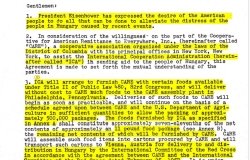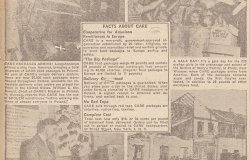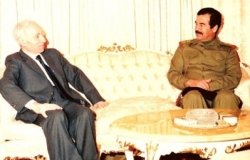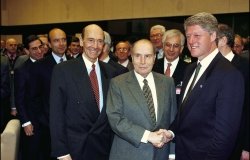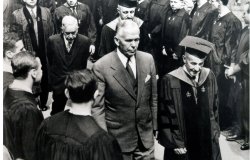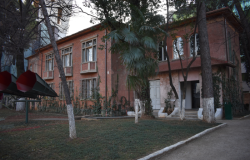
A blog of the History and Public Policy Program
A CARE Package for Hirohito
In November 1950, Cooperative for American Remittances to Europe (CARE), Inc., sought to deliver a symbolic aid package to Japanese Emperor Hirohito.
The 13 November 1950 edition of the Hawaii Times (布哇タイムス), a a bilingual newspaper published in Honolulu, Hawaii, contains an article entitled “CARE Supplies for His Majesty the Emperor.”
The report was based on a Kyōdō News (共同通信社) telegram from Tokyo two days earlier. It states that from July 1948 to the present, 100,000 packages from the Cooperative for American Remittances to Europe Inc. (CARE), worth about one million dollars, had been delivered to Japan. The Ministry of International Trade and Industry (通商産業省) would present CARE supplies to the Emperor (Hirohito 裕仁, 1901-1989) on 20 November, including food, wool, clothing, and blankets, some of which had been donated by Japanese people in Central and South America.
CARE’s plan to deliver the Emperor a package was steeped in the politics of the post-war settlement in Japan. The 100,000th CARE parcel for Japan arrived in Japan on 20 November, 1950, and was delivered to the chamber of Shidehara Kijūrō (幣原喜重郎, 1872-1951), who was the Speaker of the House of Representatives (衆議院議長). Also in attendance at the ceremony was Adrian Gory, CARE’s representative in Japan, Terashima Ryūtarou (寺島隆太郎, 1912-1964), the Chief of the Welfare Committee, and Herbert C. Mosher of the Public Welfare Division of the Supreme Command of the Allied Powers (SCAP).
The record of the meeting on 1 November 1950 between Gory and Kurokawa Takeo (黒川武雄, 1893-1975), Japan’s Ministry of Health and Welfare, shows that Gory’s intention was not merely to hold a press conference and present Shidehara with the 100,000th CARE package for Japan. He explained that the week of 19 to 25 November was the week of Thanksgiving (感謝節, kanshabushi) and also the fifth anniversary of the founding of CARE. Therefore, he proposed to present the 100,000th CARE package and one of each type of CARE package to the Imperial Family.
News reports in the Japan Times from 1948 to 1950 show that six types of CARE packages were regularly offered at the time: the Oriental food packages, woollen suiting packages, blanket packages, knitting yarn/wool packages, cotton textile packages, and baby food packages. The last type of package may not have been presented to the Emperor, according to the Hawaii Times.
For Gory, the arrival of the CARE package would provide a perfect opportunity to tie American pacification and giving with Japan’s newly reformed society. Originally called Niiname-sai (新嘗祭), the 23rd of November coincided with an ancient harvest festival that had become a national holiday rooted in State Shintō (国家神道, Kokka Shintō) mythology since the Meiji reign.
In the years since World War II, US-led occupation authorities had come to believe that Japanese militarism had stemmed from state monopolies, tyranny, and widespread poverty. State Shintō mythology, they argued, reinforced that militarism and had to be stifled in order to rebuild Japan as a peaceful and non-militaristic polity. Wide sweeping reforms were needed to smash authoritarian political rule, equalize political rights, and transform values, and the renaming of national holidays rooted in State Shinto mythology became a part of that process. In 1948, the Japanese government had given Niname-sai a secular name: Labour Thanksgiving Day (勤労感謝の日, Kinrō Kansha no Hi).
Did Hirohito receive the CARE packages? The record of the aforementioned meeting between Kurokawa Takeo and Adrian Gory is now held by the National Archives of Japan (国立公文書館). It was at this meeting that the men negotiated the logistics of the package delivery. However, the actual delivery was never reported on in the Japanese and English newspapers in the Japanese homeland, nor recorded in the Shōwa Tennō jitsuroku (昭和天皇実錄, The Veritable Records of the Emperor Shōwa) compiled by the Imperial Household Agency (宮内庁).
It was not until 2022, when the notebooks of Tajima Michiji (田島道治, 1885-1968) were made public, that proof that the Imperial Household had received the CARE packages emerged. Yet the Emperor may or may not have acknowledged the delivery of the packages. Tajima, the first Grand Steward of the Imperial Household Agency (宮内庁長官, Kunaichō chōkan), mentioned that the Imperial Household had received a CARE package on 23 November. For unknown reasons, the Grand Master of Ceremonies (式部官長, shikibu kanchō) suggested that the Emperor reject the package and ask himself or the Grand Steward of the Imperial Household to inform CARE of the decision, while also thanking CARE for the package and its activities in Japan.
The Grand Master of Ceremonies at that time was Matsudaira Yasumasa (松平康昌, 1893-1957), who had been a marquis before the abolition of the aristocracy (華族, kazoku) in 1947. He held the position of Grand Master of Ceremonies from 1947 until his death. Notably, Tajima explicitly stated that the Imperial Household had received only one CARE package that day, which was different from Gory’s original plan.
Even if the packages were not received by Emperor Hirohito, Gory’s proposal to present food, wool, and clothing during the week of Labour Thanksgiving Day offers a glimpse into the multifaceted ways that American pacification and occupation were tied to the vision of American benevolence and giving in the post-War period.
About the Author
Brian Tsz Ho Wong
Brian Tsz Ho Wong is a PhD candidate (East Asian Studies) and CDCS Training Fellow at the University of Edinburgh, and a member of the CARE Global Research Team, which is researching the history of this pivotal non-profit organization in the context of American foreign aid, the Cold War, and the postcolonial world.

History and Public Policy Program
The History and Public Policy Program makes public the primary source record of 20th and 21st century international history from repositories around the world, facilitates scholarship based on those records, and uses these materials to provide context for classroom, public, and policy debates on global affairs. Read more
